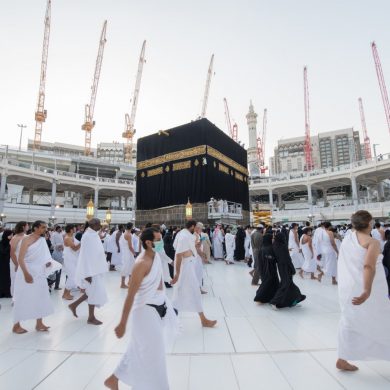Spider webs. Ghosts. Skeletons. Graves. Blood. Devils. Death.
Even without a religious reason, what is there to like about Halloween?
Every year, at the end of October, many Muslim families in the Western world engage in the occasion that is known as Halloween. Some Muslim parents may claim that “my kids don’t want to be left out”, “they live here so they should experience what the other kids experience” and “there’s no harm, it’s just a bit of fun”, and use these ideas to justify dressing their children up for Halloween. The reality is that in Halloween, there is more harm than good. It’s our responsibility as Muslims to learn about something before we do it. On the Day of Judgement it will not suffice to say that we did not know, if we could have dug deeper and assessed whether what we are doing pleases Allah (swt) or not, but we chose not to.
Here is why Muslims must not celebrate Halloween:
1. The origins of Halloween contradict core Islamic principles
Halloween is originally a pagan festival marking the beginning of winter and the night they believed that dead spirits would roam, which they would try to ward off with scary costumes and masks, as well as offering sacrifices. Additionally, the occasion is associated with devil worship and superstitions, all themes which overtly contradict Islamic teachings . In Islam, our faith is grounded in Tawhid (monotheism), and anything which has any hints of shirk, even if it is subtle, is rejected. We worship only Allah (swt) and believe in His Oneness, so occasions such as Halloween which are rooted in paganism and shirk should not be celebrated by any Muslim. We highly recommend you do the research so that you are able to teach your children about the truth of Halloween; a simple internet search will lead you to all sorts of beneficial information about the origins of Halloween as well as the Islamic standpoint. Although some may claim that it has evolved to become an innocent holiday, its roots are still evident and participating is not as harmless as it may seem. As Muslims, we must only follow things that align with our beliefs. We are not afraid of the dead spirits, or of superstitions; we fear Allah (swt) and Allah (swt) only.
إِنَّمَا ذَٰلِكُمُ ٱلشَّيْطَـٰنُ يُخَوِّفُ أَوْلِيَآءَهُۥ فَلَا تَخَافُوهُمْ وَخَافُونِ إِن كُنتُم مُّؤْمِنِينَ
It is Satan who urges you to fear his followers; do not fear them, but fear Me, if you are true believers.
(Qur’an 3:175)
2. We should teach our children to be proud of their Muslim identity, even if it means “standing out”
The most important value you can teach your children is to be confident and proud that they are Muslim. With occasions such as Halloween, parents feel tempted to allow their children to participate out of fear of their children feeling different to the others. Rather than submitting to this fear, Muslim parents should sit with their children and explain to them why we don’t celebrate Halloween. If they feel you are respecting their intellect and explaining the reasons, they will be confident to reject Halloween themselves. Explain to them that they are not missing out, rather Islam protects us and we must avoid anything that goes against Islamic principles. Remind them why they are lucky to be Muslim and everything beautiful about Islam. True ‘fun’ is in doing things that please Allah (swt), and there is a lot of permissible ‘fun’ in Islam. Also remind them that it is ok to be different if you are doing the right thing. This concept is vital to convey, since children should not become used to adopting certain practices or ways of life purely to ‘fit in’ or out of fear of being different. They will inevitably face many situations like this throughout their lives, so we must show them the importance of protecting their beliefs even if there are external pressures.
إِنَّ ٱلَّذِينَ قَالُوا۟ رَبُّنَا ٱللَّهُ ثُمَّ ٱسْتَقَـٰمُوا۟ تَتَنَزَّلُ عَلَيْهِمُ ٱلْمَلَـٰٓئِكَةُ أَلَّا تَخَافُوا۟ وَلَا تَحْزَنُوا۟ وَأَبْشِرُوا۟ بِٱلْجَنَّةِ ٱلَّتِى كُنتُمْ تُوعَدُونَ
Surely those who say, “Our Lord is Allah,” and then remain steadfast, the angels descend upon them, ˹saying,˺ “Do not fear, nor grieve. Rather, rejoice in the good news of Paradise, which you have been promised.
(Qur’an 41:30)
3. The Halloween costumes have bad connotations
For Halloween, people decide to dress up in costumes, most commonly imitating a cartoon or movie character. This is one of the underlying capitalistic themes of Halloween which encourages children (and adults) to associate themselves with a fictional television character and dress up as them. Most of the time, people don’t do enough research behind the movies or characters they are ultimately supporting when they choose to dress up as them. The issue of movies (especially Hollywood) and cartoons is vast and complex so there is not enough space to cover it here. However, we must all be aware that many television producers consciously try to embed damaging ideologies into the minds of their viewers, and we should be vigilant about what we and our children watch. By dressing up as a movie/cartoon character we are explicitly promoting that movie or cartoon and the ideas presented in it, and as such we have to be conscious of our actions and what we may be inadvertently promoting.
4. Islam wants us to be dignified
Partaking in the trick-or-treat rituals involves knocking people’s doors in turn for candy. Regardless of how you look at it, this act is similar to the act of begging. In Islam, we are taught to be dignified and that involves working for reward. Begging means that you ask someone to give you something without doing anything in return. This can be very humiliating, and as Muslims we reject humiliation at all levels. Therefore trick-or-treating contradicts our beliefs and we should not want to, or want our children, to take part in such activities.
These are just some of the reasons why Muslims should not celebrate Halloween or allow their children to participate in its rituals. We would love to hear your thoughts on this, be sure to participate in the discussion in the comments section.






